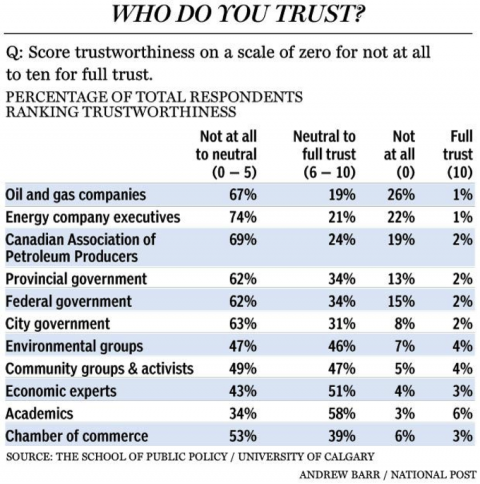Last week I testified at the joint review panel hearings into Enbridge’s proposed Northern Gateway pipeline in Prince George, B.C. It was my second time in front of the panel presenting research, on behalf of the environmental group ForestEthics Advocacy, that the Pembina Institute had conducted on the proposed pipeline and tanker project.
I was looking forward to speaking to the substance of Pembina’s research on the pipeline, such as the potential impact of the proposed pipeline on salmon, the significantly underestimated greenhouse gas emissions associated with the project, and the clear risks posed by landslides and major storms.
Enbridge avoids examining evidence in hearings
Unfortunately, I didn’t get much opportunity to talk about the substantial evidence of impacts from this project, because the lawyers from Enbridge and the Canadian Association of Petroleum Producers (CAPP) chose to focus instead on challenging the credibility of myself and other panelists from ForestEthics Advocacy and the Natural Resource Defense Council.
Trying to undermine the credibility of environmental groups is a surprising move for a company with a track record like Enbridge, especially considering a recent public survey published by the University of Calgary’s School of Public Policy. The survey found that environmental groups are among the most trusted sources of energy-related information and analysis (along with academics, economic experts and community groups), while oil and gas companies and industry associations like CAPP are by far the least trusted.
Conservative thought leaders call for a “time out” on Gateway
Throughout the past four months, increasing numbers of conservative commentators from Alberta and B.C. are reaching the conclusion that Enbridge’s proposed pipeline is not going to go through unless the company changes its approach. Deborah Yedlin, an oilsands advocate and Calgary Herald columnist, has called for Enbridge to take a ‘time out’. The Vancouver Sun’s Barbara Yaffe used the same language in a column three days later. Rod Love, the Alberta-based Conservative strategist and former chief of staff to then-premier Ralph Klein, has suggested that Enbridge needs to take a year off and then do something bold to win back public trust. Tex Enemark, former president of the Mining Association of B.C., has called the pipeline a “dead man walking” in a highly critical op-ed published in the Financial Post.
The signals from conservative thought leaders in Western Canada cannot be much clearer. Enbridge needs to reconsider how (and where) the company engages with Canadians around the Northern Gateway project — and it could start by responding adequately to their concerns rather than attacking the credibility of those opposed to the project.
Pipeline opposition continues to grow
In the meantime, while the prospect of the Gateway pipeline is shrinking, the opposition to the project and other oilsands pipelines is growing. In late October the Defend Our Coast rally in Victoria saw 5,000 concerned Canadians come out in the rain to show British Columbia’s “unbroken wall of opposition to tar sands pipelines and tankers.” A few days later there were rallies in 70 communities across British Columbia with more than 7,000 people participating.
On the opposite side of the country Enbridge has another proposal, known as the Line 9 reversal, which aims to switch the flow of an existing pipeline so that it can transport oilsands crude oil from Alberta to Ontario and Quebec, potentially for export. This project was delayed by more than a year due to public concern regarding environmental risks from shipping oilsands crude. As speculation about the potential for building more oilsands pipelines to the East increases, public opposition to such projects will likely only increase unless companies like Enbridge change their approach.
When it comes to pipelines, choosing an appropriate transportation path is critical. Understanding and respecting the perspectives of First Nations and local communities along the pipeline’s route and those impacted by any oil tanker traffic is as essential as identifying the realistic economic or environmental impacts of the project.
But pipeline opposition isn’t just about potential spills or local impacts — it’s also about what’s happening at the other end of the pipe. Increasing pipeline infrastructure is one big key to unlock rapid oilsands expansion. At a time when Canada is falling short of its climate commitments and failing to effectively monitor and enforce existing regulations designed to limit the environmental impacts of oilsands production, it’s difficult to see how constructing additional oilsands pipelines could be considered responsible.
With the Northern Gateway hearings expected to continue well into 2013, Enbridge has an opportunity to change its approach and truly engage Canadians around their concerns about pipelines, tankers and oilsands expansion. If the company fails to do so, Enbridge will have missed the point of the entire process.
Nathan Lemphers was a senior policy analyst in the Pembina Institute's oilsands program, until 2013.





